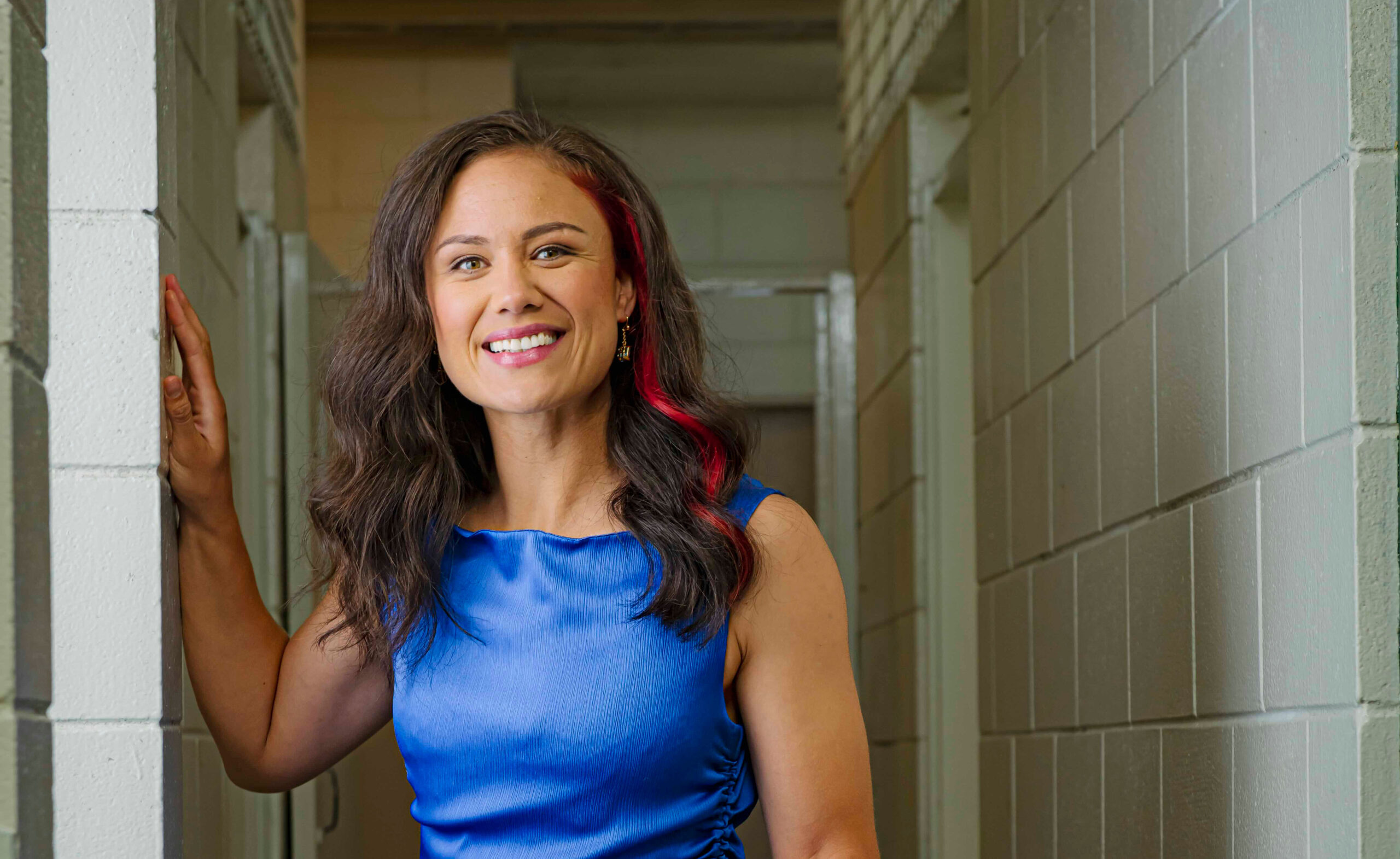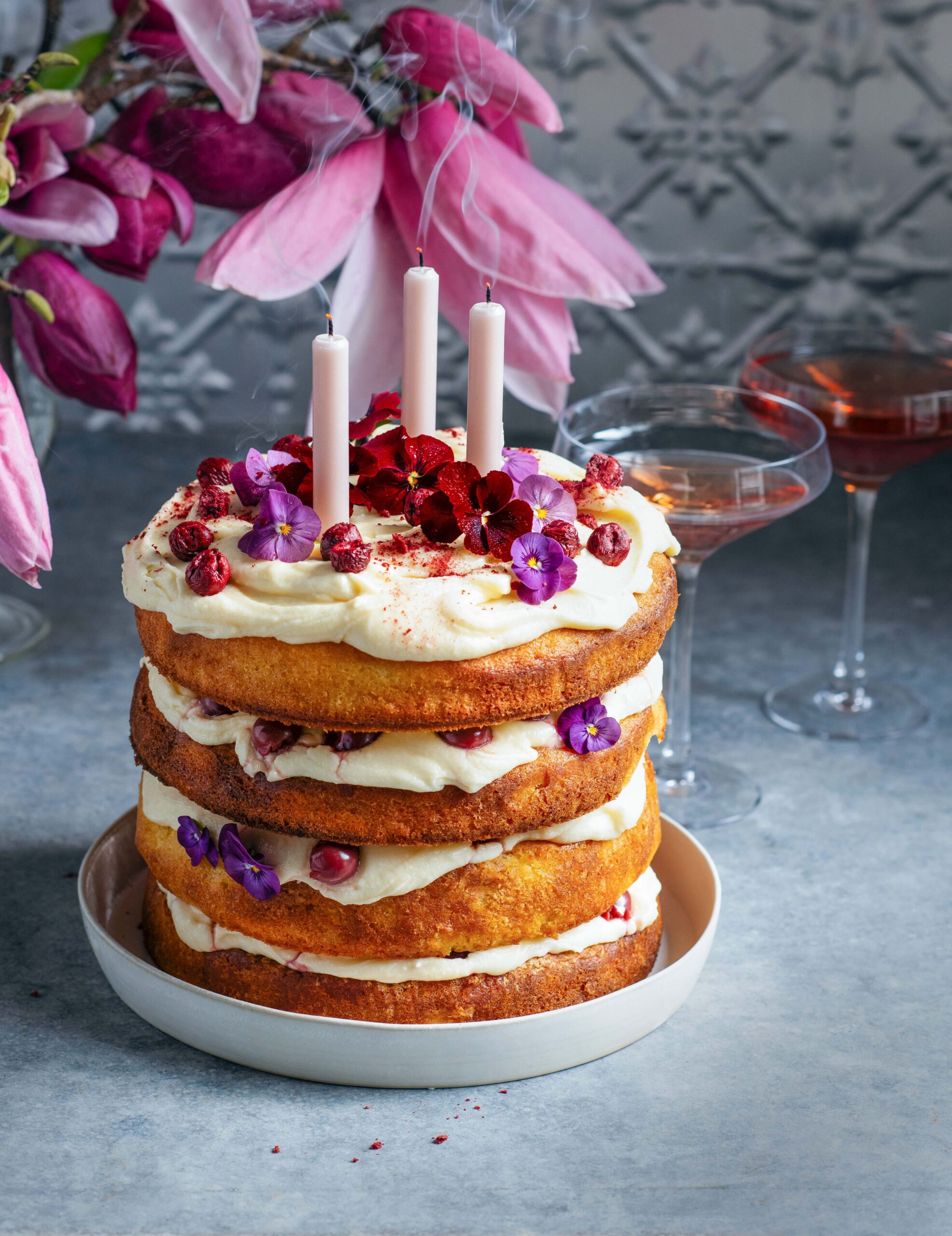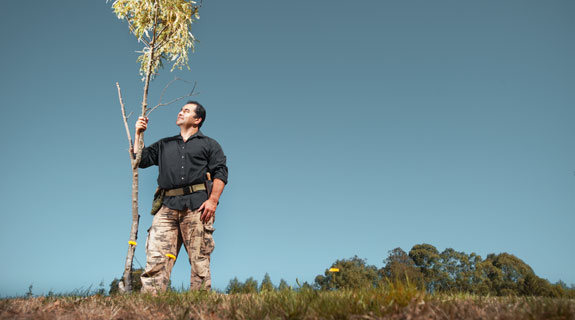Black Fern and best-selling author Ruby Tui shares her new book, resilience training bag, why she practices ‘greatitude’ and is an advocate for mental health.
World Cup-winning Black Fern, rugby winger, Olympic gold medallist, bestselling author, public speaker, sports commentator – Ruby Tui’s list of accomplishments is long, but that’s not why people hold her up to the light or are irresistibly pulled towards her.
On and off the field Tui, 31, acts from the heart and lives her values. Her authenticity and enthusiasm is contagious. Just being in her presence is uplifting and she’s all about lifting up others, and helping their dreams come true, too.
After the Black Ferns’ World Cup win at Eden Park in 2022, she famously gifted her gold medal to a young fan who had recently recovered from leukaemia and whose dream is to become a Black Fern.
Now that she’s back home in New Zealand – after a four-month sabbatical, which included two months playing for San Jose side Golden State Retrievers – one of her biggest goals for 2023 is to graduate from the University of Canterbury in front of her dad, whose dream is to see her capped.
Tui achieved a Bachelor of Media and Communications in 2012 and then carried on her studies to earn a double major in English a few years later, but has never been able to physically graduate because of overseas games or training commitments.
“It’s always been a dream of Dad’s so my goal for this year and my sabbatical year is to graduate physically down in Christchurch and for my dad to be there,” she says.
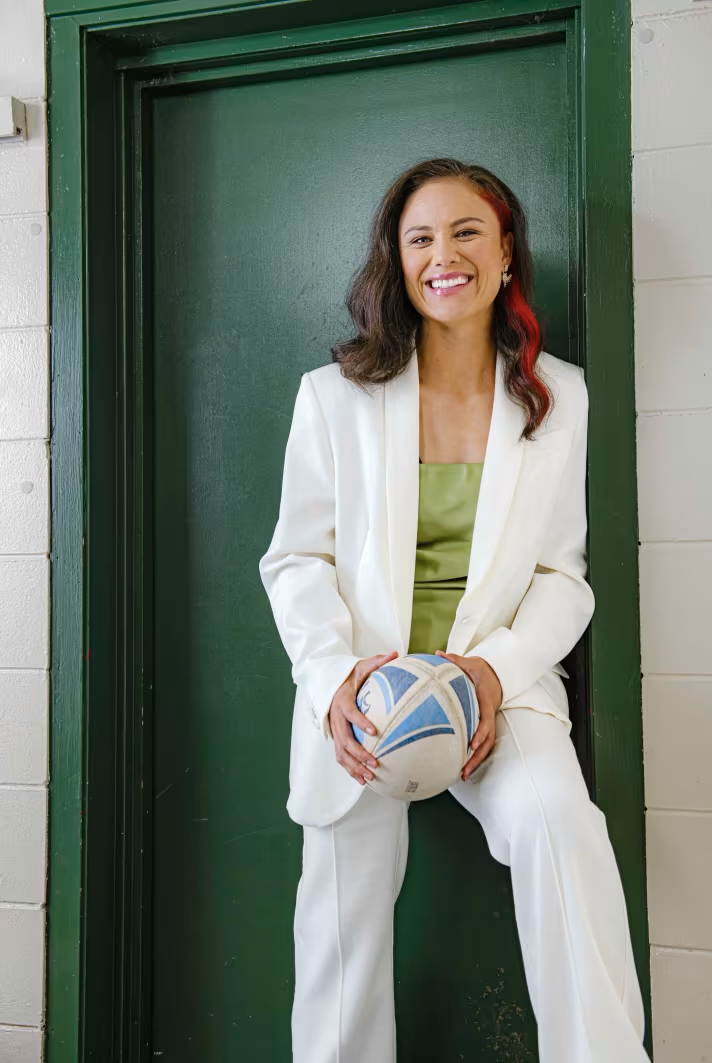
New book
This month her new book, Little Ruby & Friends, also hits the shelves. It’s a children’s book that she wished she had when she was growing up.
The book has been in her head for a while and she’s delighted that it’s finally out in the world.
“Life is about being able to deal with the ebbs and flows of life, it’s not about being happy 24-7. You have to gather these tools and figure out how to deal with your mental health on the bad days as well as the good,” explains Tui.
“I had a really good friend on the Sevens World Series circuit and Sevens. She knew she was adopted from a very young age. I asked her, ‘how did you deal with that?’ ‘How did your mum tell you?’. She said the day she found out, her mum read her a kid’s book which explained it so clearly and perfectly that she’s understood it her whole life and has always been okay with it. That stuck with me and as I’m on this journey of mental health I thought, if you can’t explain it in a kid’s book you probably can’t explain it well enough. I’ve had it in my head for years, the concept of when a person is upset and how that can look like so many different things and I thought I want to be able to explain this in a kid’s book.”
Like everything Tui touches, the book is 100 per cent authentic. Each of the friends named in the book are real life childhood friends who’ve helped her get through hard moments in her life. Through reading the book, Tui hopes kids will see that being upset looks like many different things and that when somebody’s acting out of sorts or out of character, it’s nothing to do with you, often it’s just that they are upset.
“You can be upset for varied reasons, and on top of that the way for people to feel better is different for everyone. I wanted it to be a concept that I could explain to kids in a fun, easy way that everybody deals with mental health issues differently.
It looks different for everybody, but there are lots of different solutions to that as well,” she says. “My journey in life has been learning about this stuff the hard way and learning tools and language to help navigate that space.”
The other key thing in the book is little Ruby doesn’t come along and save the day. Her friends already know what they want and how they want to be treated and they communicate that. “I want kids, with their parents, when they’re reading the book to be like, ‘how do I want to be treated in this situation or when I feel upset?’ I would have really liked that conversation as a youngin.”
Tui’s parents separated when she was young, which meant splitting her time between her dad’s Samoan family, and the home she shared with her mum in Newtown, Wellington. Despite being exposed to drugs and alcohol at a young age, life in Wellington was a dream compared to what was to follow.
When her mum met her new partner, they moved to Canvastown in Marlborough where Tui bore witness to domestic abuse, endured periods of isolation, extreme loneliness and didn’t feel safe.
She hopes the book will not only be a tool and gift for children but also parents. “I think as kids we all see our parents go through really hard times and unfortunately sometimes emotion gets the better of us. I just hope the book is a catalyst for that conversation.”
The book is also a metaphor for being brave and stepping outside your comfort zone, using the example of little Ruby tackling the scary heights of the jungle gym with the support of her friends. Halfway up, little Ruby’s hand slips and she almost falls. “It’s reeeeeally high up here” and she feels scared. Her friends give her some space to think, and she whispers to herself, “Of course I feel scared. I’m doing something scary!
But you can only be brave when you’re doing something scary… I’ve got this!” And she makes it to the top.
“If I could change the kaupapa around discomfort and scary, it’d just be awesome,” says Tui. “I think the jungle gym is the perfect analogy. How many kids go, ‘oh, I’m scared’ but then they get to the top or cross the monkey bars or whatever. It’s a two-sided equation. Without the scary, you don’t get that awesome feeling of accomplishment. That’s been a big part of my life learning.”
Building resilience
Resilience is one of Tui’s favourite topics. She jokes that she could probably write a book on it because she’s that passionate about it – its layers, and how it means very different things to different people; how it can be built to provide strength for our next journey or chapter.
“Something you or I go through could be very different situations, but they will be equally important to building us as characters,” she explains. “It’s what makes us who we are.
I visited Hawke’s Bay with Dan Carter after the floods, and I was just standing there thinking ‘you could study resilience in books, but these people have a degree in it’. Sometimes we look upon things with shame or sadness or grief and it is totally okay to feel that, but sometimes people miss that they’ve got a level or learning of resilience that no one else will ever get so I think resilience not only is character-building, it’s everything we’ve been through to get where we are. It’s this ongoing, absolute unique experience to us. Ruby’s resilience is different to my mate Jess’s resilience. I hope that no one undermines their own personal level of resilience because the truth in life is the specificity of the resilience that you get is only for you, and it’s absolutely meant for you. Everything you go through in life, first of all, congratulations. Secondly, you’ve built resilience. And thirdly, we all need the resilience from our past and from our learnings and even from our tūpuna – it goes deep – to face what we’re about to come across. I think the cool thing about resilience is we don’t know how important or how much resilience we have until we reach that moment and go, ‘wow, I can do this. I can get through this. I can climb this jungle gym’.”
Her hope is that everybody acknowledges their own resilience for them and that’s why she believes dealing with our traumas and grief is really important “because if you just take the grief out of it, you miss all the resilience. You miss all the stuff that makes you, you.”
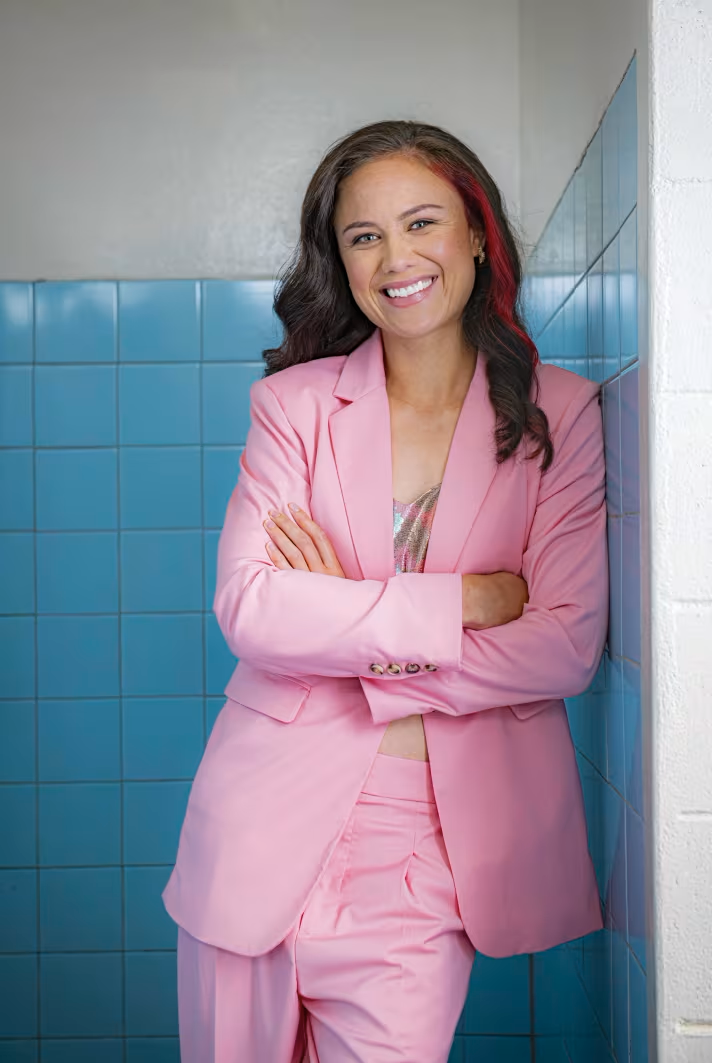
Revisiting the past
Tui shares in her first book, her autobiography Straight Up (Allen & Unwin NZ), how she once contemplated ending her life as a child when she lived with her mother and her mother’s abusive partner in Canvastown – a place where she saw her mum struggle and where she was at the lowest point in her life.
As an adult, she’s twice gone back to visit the location of the hardest times of her childhood memories.
“It was scary going back to that place but physically going back, the feeling of growth I had as a person was undeniable both times and it took resilience to go back there and know that I’m safe. I’m okay now. But the resilience I had when I left was, ‘man, I feel I can do anything’. As long as I’m true to myself and I’m a good person. Resilience gives you this key to unlock the next part of your dreams.”
Losing the gold medal in Rio and coming home with silver was also a resilience-building exercise that she consciously used to achieve gold at the Olympics in Japan. Yes, winning silver was great but the last game they played, they lost. She remembers every training from Rio to Tokyo, which ended up being five years because of Covid.
“I couldn’t forget the taste of the silver. I felt impenetrable when it came to it. You could smash me for eight hours straight at training and I’d happily run to it. I just was like; I don’t care what it takes. I’m going to make sure it happens because I felt like I’d almost given everything, and we got silver. So, there’s no way I was leaving any stone unturned. And if we won silver, so be it. But as long as the taste was, I did everything I could. That was the kind of resilience that I got out of it. It was this unwavering work ethic.”
Greatitude
You won’t find ‘greatitude’ in the English dictionary but it’s a real word in Tui’s vocab, and it’s one of her core values. It’s not enough to say she is simply grateful for something; it’s doing great actions that show she’s grateful. In rugby that means studying the game any spare moment, adding extra training sessions, and looking after her body – working out and eating well. If there’s too much sugar in something she’ll keep going until she finds a piece of fresh fruit.
“We are the best storytellers in the world, the stories we tell ourselves,” she says. “So, I think evidence is important – not for anybody else, just for ourselves, showing ourselves evidence of things because of the stories we tell. You know, you wake up and you’re like, ‘oh man, I’m a bad person’, you need evidence to back up the argument that you’re a good person. And it sounds funny, but it is a thing in life. We’re constantly telling ourselves things about ourselves and I’m going to give myself evidence every day that I am grateful. So, when I have those moments of doubt, it’s like, ‘nah, you’re great. You got up this morning, you did extra recovery, you didn’t have to do that’. When I’m out there on the field and the doubts come in, it’s like, ‘nah, you’ve done everything, you’ve absolutely been grateful this whole time. Nobody can tell you otherwise’. In a way, it’s a resilience builder. It’s a huge value that’s really helped me out in tough times. It’s dealing with the tough and the good.”
She’s also grateful to have had the opportunity to take a sabbatical, and for the experience of playing for the Golden State Retrievers, and admits it was a big thing for her to go to another country and play in a competition where she didn’t know a single person on her team. But she took a leap of faith and is glad she did.
Throughout, she’s also made herself available to the Black Ferns team members who often message her. And she’s really honest with them. “The best mentors I had were the honest ones. I’m grateful for the position I’m in to help and be able to give back in that way and I always do it with honesty.”
Self-love
She has also taken the time to sit down and prioritise what living her values looks like.
There have been times in her life when she has said ‘yes’ to absolutely everything, and that’s where she needed to be. Recently she’s had to say ‘no’ to a lot of things, including things that she loves and to people who she loves because she can’t do it all.
Writing her book Straight Up was a big commitment that took a lot of time. But it was worth it. It was the bestselling New Zealand published book in 2022 and continues to feature in the bestseller list this year.
What Tui chooses to say ‘yes’ to always has to align with her values, which includes being true to herself. “The definition of being authentic is doing and saying what you actually think. The key is to figure out what do you actually think about the world, about yourself, and sometimes it’s not nice what you find out, but that’s okay, because you can’t change it until you figure out what you’re changing, and that needs to be defined – what you’re changing from, what you’re changing to.”

Defining moment
If there were a life-changing moment in her career to date, it would probably be the Tokyo Olympics where the women’s Sevens team won gold. But specifically, it was the order of play.
Historically women play first and then the men, but this time the double-header was the other way round.
“The order shouldn’t matter, but historically as someone who has been in the game for as long as I have, it was a big deal. Today, I wouldn’t comment on that. But we were in the final game, it was hard rugby and we went out and won gold and I felt like everybody in New Zealand was watching it and I remember thinking, ‘what have we done here?’ Yes, I’d gotten rid of the sour silver taste and we’d come together as a team, but stepping back further I think what we’d actually done was press this huge, big green button that said GO on women’s rugby in the country and a big GO button for women’s sport.
I remember thinking, ‘this is the beginning, it’s the beginning that so many of us have been working so hard for’.”
Feeling lucky
Being one of the Black Ferns 15 who won the 2022 World Cup, Tui is grateful for the honest conversations and her teammates who she feels honoured to be around every day.
“Rugby aside, just the humans that they are. I’m like, ‘wow, I still have so much to learn and so far to go’, and it helps because you don’t get sucked into the score lines and what that means about you, because it doesn’t mean anything about you. How you deal with the score line means a lot more. Who’s picking up the rubbish in the changing room at the end of the day? Who’s constantly offering themselves up? Who’s doing extra passing in the hallway? I’m just surrounded by inspiration and it’s a beautiful honour.”
Ruby’s message
If there was a message she’d like to send to mothers, aunties and grandmothers of young female athletes across the country, Tui says she’d love to meet everybody and have a cuppa, and keep at it because a crazy number of CEOs and CFOs and people in leadership roles have also played sport.
“I’ve loved sport ever since I could walk because it doesn’t matter where you come from, what you earn, who you are, colour of your skin – as soon as you cross that white line, what have you got? It’s just a complete equaliser. You’ve got to have the goods every single time. And so, sport to me has just been this huge catalyst throughout my life that I truly believe saved my life. It grows leadership, it grows you as a person, it grows your ability to grow, and it puts you in these situations in life that you can handle that others potentially could not.”
And if you feel like you’re the worst in the team and shouldn’t really be there, “bloody stay right where you are.”
“We can be very hard on ourselves for not being the best, and it’s funny because starting rugby, after playing netball for so long, I was just the absolute worst. I was in a team full of these superstars and experienced people, I used to think, ‘oh man, I’m so bad, I probably don’t belong here’. But the truth is, I learned so much from everybody. So, I’ve learned, if I can get in a team or a room where I’m the worst, it’s actually so good. It’s an opportunity that just gets missed all the time. People are like, ‘oh, I’m so bad, I need to leave the team’. But just by standing there, living and breathing, you can actually get so much better. I actually hate it now when I’m one of the better ones in the team. It frustrates me because I’ve got to get really creative about how to get better. Leading up to Tokyo I’d meet with my coach an hour earlier than anybody else and I’d do an extra session every day. That’s because I was one of the better ones.”
Now that she’s back in Aotearoa she’s relishing being able to have a coconut latte with eggs bene, as well as the Black Ferns environment with coach Allan Bunting. Whether she makes the team or not, she’s going to give it her all.
“I’ve been playing rugby for a long time, so every second I get to boot up is really special to me, so I’ll be giving my heart to that.”


